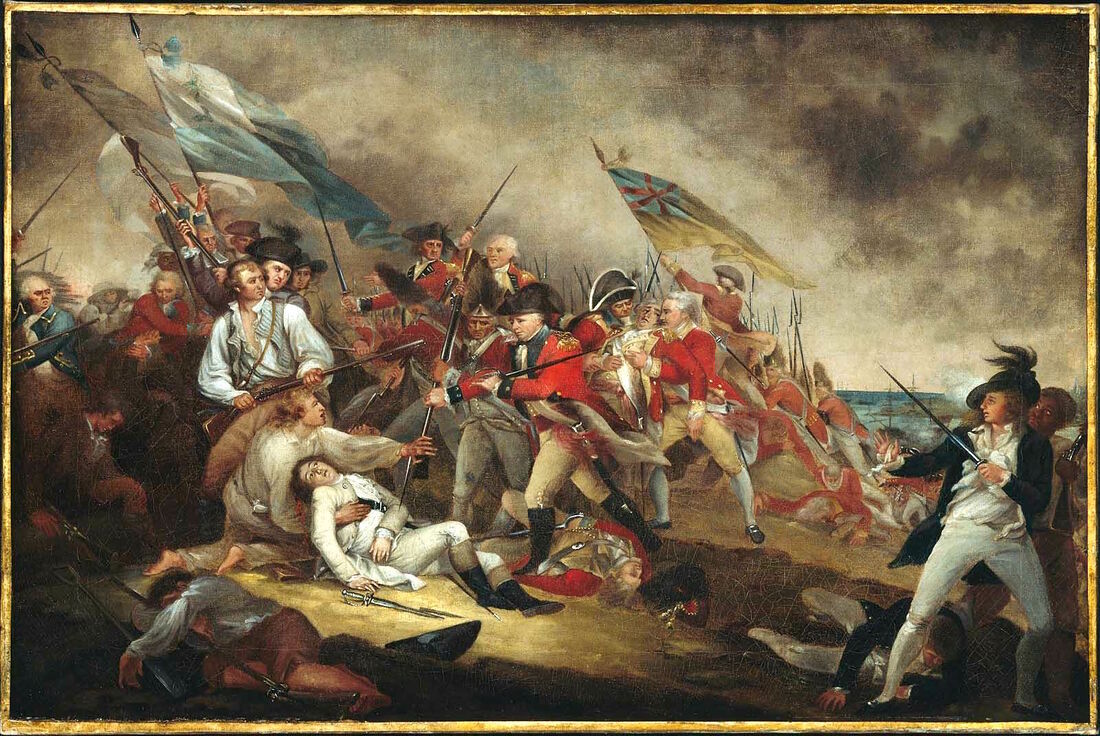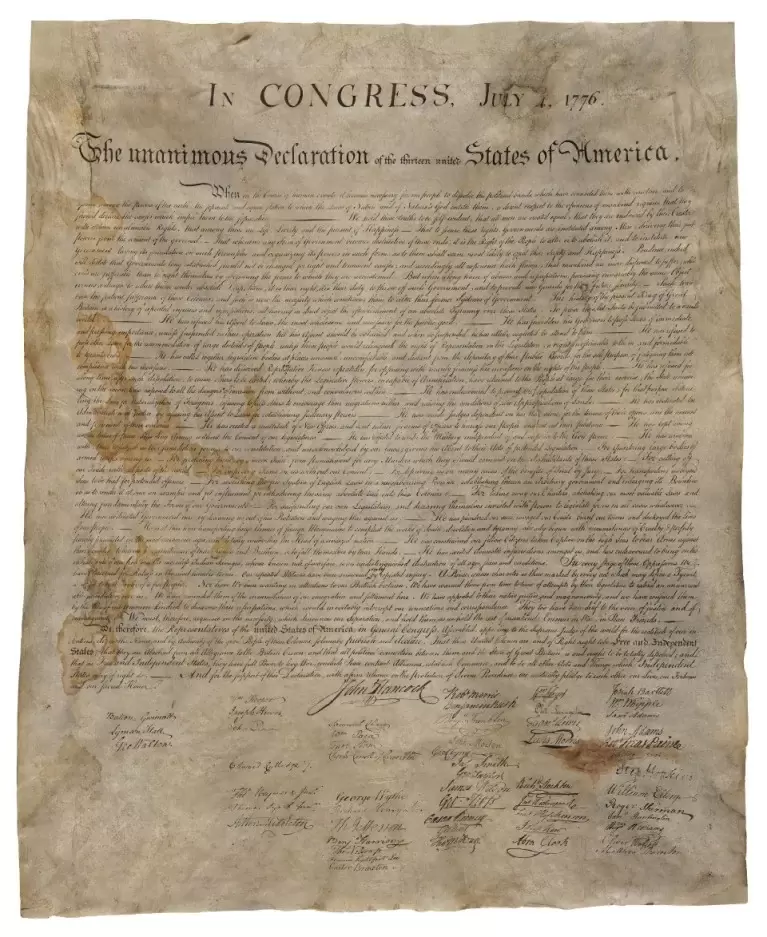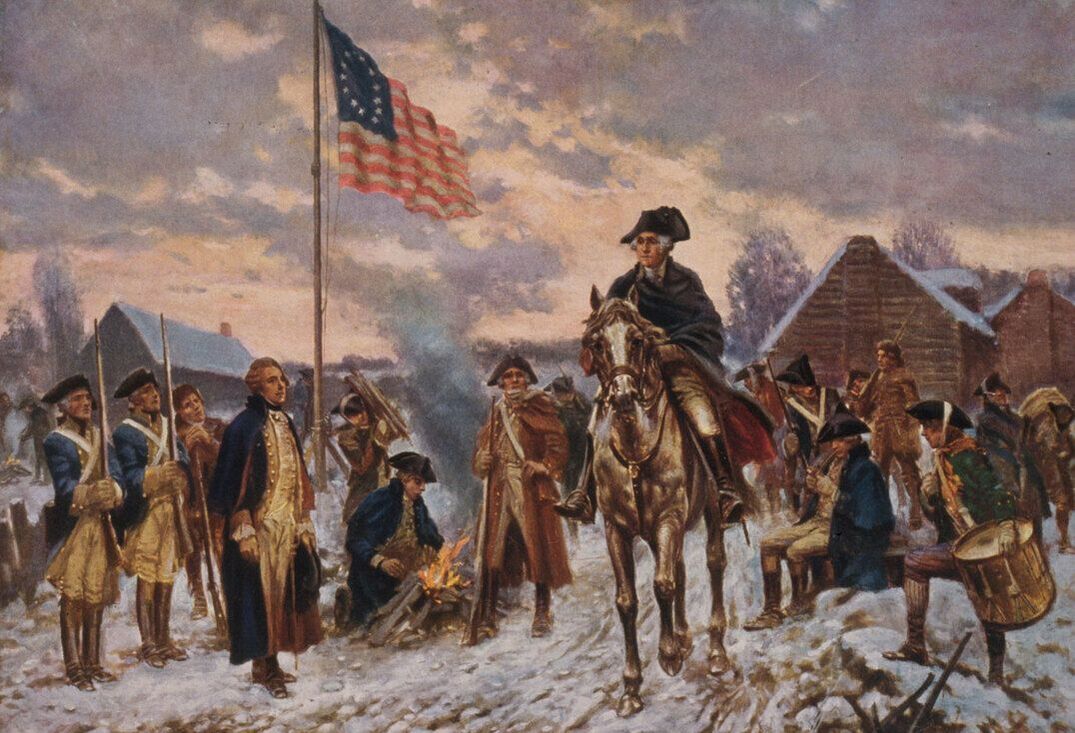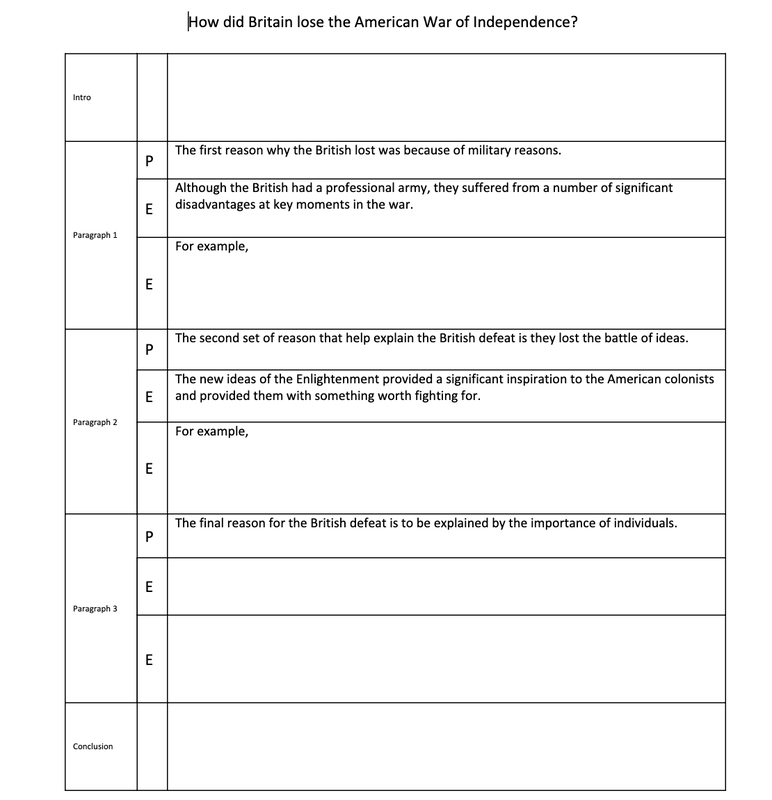Lesson 8 - Why did the British lose the American War?
When war began between Britain and the American colonists, it seemed likely that Britain would win. It was the most powerful country in the world at that time. The British government had a trained army and one-third of the people in the colonies remained loyal to them. The colonists who supported the struggle against Britain were known as the Patriots. At first they did not have an army or even a leader.
When war began between Britain and the American colonists, it seemed likely that Britain would win. It was the most powerful country in the world at that time. The British government had a trained army and one-third of the people in the colonies remained loyal to them. The colonists who supported the struggle against Britain were known as the Patriots. At first they did not have an army or even a leader.
|
The Battle of Bunker Hill
At this time an American army was besieging General Gage's troops in Boston. Washington set out to lead it, but before he arrived the Americans were defeated in a battle at Bunker Hill (see right). Washington found the American army in terrible shape. He set out to impose discipline. Soldiers who deserted were executed and one officer was whipped in front of his men. Washington wanted to drive the British from Boston. In March 1776 he began to bombard the city with cannon fire. American troops now surrounded Boston and the British commander General Howe realised that he could not hold out. On the night of 17 March the British troops left Boston. |
|
|
Thomas Paine and Common Sense
Although war had started, the Patriots were still not sure if they wanted to leave the British Empire. Most of them were descended from British settlers and they were still loyal to King George. All this changed in January 1776 when a pamphlet called Common Sense appeared. It was written by an Englishman, Thomas Paine. In a plain and easy-to-understand style, he urged Americans to declare their independence and become a republic. Over 150,000 copies of Common Sense were sold and it had a huge impact on the Patriots. (You don't have to watch the film opposite but I would, it's very funny. Mark Steel is one of my favourite British comedians.) |
|
The Declaration of independence
On 4 July 1776 the Second Continental Congress issued the Declaration of Independence. Thomas Jefferson, a delegate from Virginia, wrote it. It claimed that King George had failed to protect the rights of the American people and stated that: 'A Prince, whose character is thus marked by every act which may define a tyrant, is unfit to be a ruler of a Free People.' Below is the most famous extract from the declaration. 'We hold these truths to be self-evident: that all men are created equal; that they are endowed by their Creator with certain inalienable rights; that among these are life, liberty, and the pursuit of happiness; that to secure these rights, governments are instituted among men, deriving their just powers from the consent of the governed; that whenever any form of government becomes destructive of those ends, it is the right of the people to alter or to abolish it and to institute new government.' The ideas contained within this extract were very advanced for the time. It says that a person has certain rights given to him/her from God. To protect these rights, people form governments. If governments fail to protect these rights then the people have a right to form a new government. Jefferson is saying that the British government, by behaving as it did, lost the confidence of the American people. Therefore a new government should be formed in its place. |
The Declaration of Independence raised American spirits but in 1776 and 1777 the war went badly for them. Washington found it hard to keep his army together. Unlike the British, who had full-time soldiers, his army was made up of ordinary men who joined up for six months at a time. Many of them were farmers and when their six months was up, they often went home to look after the farm
Trenton and Valley Forge
In September 1776, the British captured New York, which became the British base for the rest of the war. Washington, fearing that his cause would inevitably collapse as short-term enlistment into the Continental Army expired, launched a risky attack on the little town of Trenton, held by a brigade of Hessians (German troops in British service) on Boxing Day 1776. He won this battle, and although the victory was small in tactical terms, it had a wider strategic impact, showing that the patriots were still in the fight.
Trenton and Valley Forge
In September 1776, the British captured New York, which became the British base for the rest of the war. Washington, fearing that his cause would inevitably collapse as short-term enlistment into the Continental Army expired, launched a risky attack on the little town of Trenton, held by a brigade of Hessians (German troops in British service) on Boxing Day 1776. He won this battle, and although the victory was small in tactical terms, it had a wider strategic impact, showing that the patriots were still in the fight.
|
In 1777, British forces under Lord Cornwallis captured Philadelphia where the Congress met. This was a major blow to the new republic. Washington and his men were forced to retreat to a wild and lonely spot called Valley Forge. (Right)
Here his army spent the winter of 1777-8 in horrible conditions. Food was short and rations were reduced to one-eighth of normal. Disease was widespread and over 2,500 men died. Many soldiers deserted, and Washington and his officers struggled to maintain discipline. Washington won the admiration of his men by remaining with them at Valley Forge. A French nobleman, the Marquis de Lafayette, was there too. He greatly admired what the Americans were doing. Later he played a major role in the French revolution. |
France comes to the aid of the Americans
But while Washington and his men were suffering in Valley Forge, another American army defeated the British at Saratoga. When news of this reached Europe, King Louis XVI of France decided the Americans might win. He declared war on Britain. He wanted revenge for the British conquest of Canada. French help was vital to the Americans. French troops were useful but the French navy was even more important. It made it difficult for the British navy to bring guns, ammunition and fresh soldiers to equip the British armies in America.
The final event in the war showed how important the French fleet was. Washington trapped a small British army under their commander-in-chief, Lord Cornwallis, in Yorktown. Cornwallis had made the mistake of allowing himself to cornered. A French fleet arrived in the harbour and prevented Cornwallis from escaping. Cornwallis had no option but to surrender. He said he was ill and sent his second-in-command, General O'Hara. Washington sent his second-in-command, General Benjamin Lincoln, to accept the British surrender on 19 October 1781. When the British Prime Minister, Lord North, heard this news he said, 'Oh God! It is all over!’ It was. The British had lost their thirteen American colonies.
But while Washington and his men were suffering in Valley Forge, another American army defeated the British at Saratoga. When news of this reached Europe, King Louis XVI of France decided the Americans might win. He declared war on Britain. He wanted revenge for the British conquest of Canada. French help was vital to the Americans. French troops were useful but the French navy was even more important. It made it difficult for the British navy to bring guns, ammunition and fresh soldiers to equip the British armies in America.
The final event in the war showed how important the French fleet was. Washington trapped a small British army under their commander-in-chief, Lord Cornwallis, in Yorktown. Cornwallis had made the mistake of allowing himself to cornered. A French fleet arrived in the harbour and prevented Cornwallis from escaping. Cornwallis had no option but to surrender. He said he was ill and sent his second-in-command, General O'Hara. Washington sent his second-in-command, General Benjamin Lincoln, to accept the British surrender on 19 October 1781. When the British Prime Minister, Lord North, heard this news he said, 'Oh God! It is all over!’ It was. The British had lost their thirteen American colonies.
How to write a history essay (again).
The first thing a good history essay must do is avoid telling the story. Looking back on the past as a series of events unfolding, it might be tempting to write a 'chronicle' about the past as simply 'one thing after another'. My account of the American War of independence above is a bit like that, it tells the story of some of the important events in the American War. It begins at Bunker Hill and ends at Yorktown, but it does not directly address the question of why the British lost. To answer the question you have to dig around a bit. That's the point, a good essay will have done the digging for you. A good essay will have found all the important bits, put them into labelled boxes, brushed away the loose soil and made a nice cup of tea.
In contrast to my account, a good history essay must explain why the British lost through a series of big points (the labelled boxes), each of which addresses the question. The hardest thing when writing an essay can be to decide what your big points are. Big points are not examples, but rather they are 'themes' that can be illustrated by a number of examples. Big points require you put similar examples together. For example, I have just decided there are three reasons why the British lost:
The first thing a good history essay must do is avoid telling the story. Looking back on the past as a series of events unfolding, it might be tempting to write a 'chronicle' about the past as simply 'one thing after another'. My account of the American War of independence above is a bit like that, it tells the story of some of the important events in the American War. It begins at Bunker Hill and ends at Yorktown, but it does not directly address the question of why the British lost. To answer the question you have to dig around a bit. That's the point, a good essay will have done the digging for you. A good essay will have found all the important bits, put them into labelled boxes, brushed away the loose soil and made a nice cup of tea.
In contrast to my account, a good history essay must explain why the British lost through a series of big points (the labelled boxes), each of which addresses the question. The hardest thing when writing an essay can be to decide what your big points are. Big points are not examples, but rather they are 'themes' that can be illustrated by a number of examples. Big points require you put similar examples together. For example, I have just decided there are three reasons why the British lost:
|
■ Military reasons, especially the role of France.
■ Cultural reasons and the inspiration of Enlightenment ideas. ■ The strengths and weaknesses of important individuals. For each of these 'big points' I can think of a number of examples I can use to support each point. Activity 1. Copy the text 'Why did the British lose the American War? and paste it into a Word/Pages document. 2. Highlight the examples of military, cultural and individuals in different colours. Remember you are looking for examples that can be used to support your point. e.g. do not highlight an example of British military success. 3. Using your colour coded examples, complete this essay plan with examples for each of the three big points we are making. 4. Write an introduction and a conclusion. When completed upload your essay to your OneNote. |




